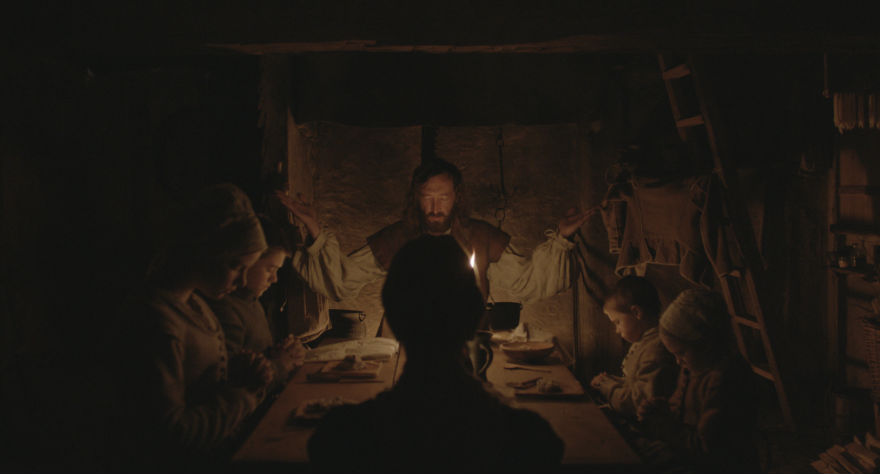
Almost sexual in its slow build to climax, Eggers' period piece carefully illuminates the horrors of domestic mistrust and misogyny.

Almost sexual in its slow build to climax, Eggers' period piece carefully illuminates the horrors of domestic mistrust and misogyny.
Robert Eggers‘ The Witch gets under your skin and stays there, making you feel a certain kind of filthy for a good chunk of time (for me, a few days of looking over my shoulder at night and rubbing the back of my neck like a crazy person). Contributing to the film’s noxious effect on the psyche are a litany of major and minor details: the American-gothic allure of the 1630s New England setting; actor Ralph Ineson‘s incomparable, gravelly voice; a collection of the most sinister-looking animals you’ve ever laid your eyes on. (Away, evil bunny! Away!) But the real reason The Witch sticks so tightly to the back of the mind is that it leaves us lost in the fog, uninterested in demystifying the terrible, unsettling, supernatural events we bear witness to. Super-serious horror movies aren’t my preferred branch of the genre but when they work, as Eggers’ film does, I can’t help but bow down as I quiver in my 17th-century boots.
The backdrop of this “New-England Folktale” (as the movie is subtitled) is an isolated farm on the edge of a dark wood where a Puritan family resides and tends to crop. Why anyone would choose to live with an ominous ocean of decrepit-ass trees at their back I don’t know, but in this instance, it was the decision of the family’s patriarch, William (Ineson). After being banished from their plantation community (for unknown reasons), the family needed a new place to make a life for themselves, hence the lonely little farm at the foot of hell’s gates.
With a stern hand and a booming voice, William raises his litter alongside his wife, Katherine (Kate Dickie), who’s scary in a stoic, nun-like way. They’ve got an infant, Samuel, who one day disappears while under the watch of their eldest, Thomasin (Anya Taylor-Joy). While the parents and Thomasin’s younger brother, Caleb (Harvey Scrimshaw, who has a shining moment that must be seen to be believed), are convinced the newborn to have been taken by wolves, young twins Mercy (Ellie Grainger) and Jonas (Lucas Dawson) have a more twisted theory, that baby Sam was taken by the witch of the wood, who they believe to be none other than their dear older sister. The mischievous tykes’ tall tale would probably fall on deaf ears under normal circumstances, but Samuel’s vanishing has thrown the family into a state of panicked hysteria; suddenly, sweet, sensible Thomasin becomes the family scapegoat. Eggers gives us a glimpse of moldy corn, which may or may not effect your perception of the unfolding events. Curious.
Female repression emerges as the movie’s major theme as Thomasin is poked and prodded into a corner with dubious accusations slung at her by the twins and her own mother. The hatred mistrust spirals out of control when Caleb wanders into the forest and returns one night, naked and not quite himself. The blame’s heaped on Thomasin and even William begins to question his daughter’s virtue. One can only take so much abuse; if they want Thomasin to be the witch so desperately, maybe she should play along.
Eggers’ film is rife with Satanic imagery (the family’s goat is suggestively named “Black Philip”), but the real horror comes from the volcanic family tension and their religiously fueled motivations. The movie’s set in a time when things we now consider supernatural—witches, ghosts, demonic possessions—were strongly accepted part of the natural world. The Puritanical mindset of the time almost acts as a magnifying glass for the subconscious fears of moderns like us: Misogyny is disconcertingly prevalent in today’s society, but discrimination against women was even more extreme in the time of The Witch. Gender inequity is the source of myriad societal fears, anxieties, struggles, and conflicts, and at its core, Eggers’ story digs down to the roots of this enduring friction, particularly in this country. The fact that Thomasin is on the brink of sexual awakening just as her loved ones turn on her adds another layer of richness to the predominantly feminist narrative.
A jump-scare rollercoaster The Witch is not; it’s more like those dead-drop rides that crane you into the sky at an agonizingly slow clip and then plunge you toward the ground when you reach the apex. Moments of subtle, subconscious dread are stacked on top of each other carefully by Eggers until the overwhelmingly tense final act. I was relatively calm during the majority of the film, but I was absolutely frozen in fear for the last twenty minutes or so. The horror is cumulative, and the escalating, asymmetrical shape of Eggers’ story is a nice change of pace for the genre.
Take one look the detailed design of the family’s cabin and the period-accurate costuming and it becomes clear that Eggers’ background in theater production and scenic design is one of his most valuable assets. The textured, ashy, gothic imagery brings Bergman to mind, which speaks for itself. Cinematographer Jarin Blaschke, costume designer Emma Fryer and composer Mark Korven (whose wailing choral arrangements are absolutely blood-curdling) keep the movie’s production standards high on all fronts, working in concert to make The Witch one of the most put-together, elegant horror productions in recent memory.